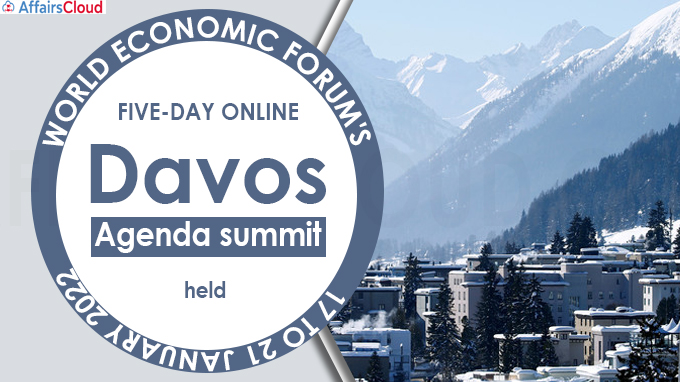
The World Economic Forum’s (WEF) five-day online Davos Agenda summit 2022 was held from 17 to 21 January 2022. The summit is being convened on the theme of ‘The State of the World’.
- The WEF has stated ‘Davos Agenda 2022’ to be the 1st global platform for key world leaders to share their visions for 2022.
- The conversations focused on topics including the COVID-19 pandemic response, the global economic recovery, climate action, technological innovation and global collaboration.
-PM Modi’s Address over the Davos Agenda
PM Narendra Modi addressed the Davos Agenda virtually and stated about COVID-19, climate change, cryptocurrency, reforms and initiatives taken by the Indian government for ease of doing business.
Key Facts Mentioned by PM Modi:
i.India is the world’s 3rd largest pharma producer. $26 billion worth of PLI (Production Linked Incentive) schemes have been implemented in 14 sectors.
ii.Though India constitutes 70 percent of the global population, it takes up power commission of only 5 percent.
iii.Digital Payments: In December 2021 alone, more than 4.4 billion transactions have been done through UPI (Unified Payments Interface) in India.
iv.More than 50 lakh software developers are working in India. Currently, India has the 3rd largest number of Unicorns in the world. More than 10 thousand start-ups have been registered in the last 6 months.
v.India is promoting ‘Ease of Doing Business’ and making it most competitive by reducing the country’s Corporate tax rate.
Note – The economic event was also addressed by Japanese PM Kishida Fumio, Australian PM Scott Morrison, Indonesian President Joko Widodo, Israeli PM Naftali Bennett, Chinese President Xi Jinping, and European Union Commission’s chief Ursula von der Leyen.
-PM Modi Introduced P3 Movement
i.PM Narendra Modi introduced the ‘P3 (Pro-Planet People) movement’ that underlines India’s climate change commitments at WEF’s Davos Agenda 2022. The P3 movement will help India achieve its sustainable environmental goals.
ii.PM Modi has recalled the idea of ‘Mission L.I.F.E (Lifestyle for Environment)’, which was introduced by him at the COP26 (26th Conference of Parties) climate summit in 2021.
India’s Renewable Targets:
i.India is on track to accomplishing only about two-thirds of its planned renewable target of 175 GW installation by 2022.
ii.In November 2021, at the Glasgow summit on climate change, PM Modi stated that India will increase the country’s installed renewable capacity to 500 GW by 2030, meeting 50 percent of its energy requirements from non-fossil fuel sources.
iii.India has set a target of net-zero carbon emissions by 2070 at COP 26 in Glasgow. At the COP 21 in Paris, India made similar ambitious announcements and aimed to reduce the economy-wide emissions intensity by 33-35 percent from 2005 levels by 2030.
iv.India also updated its Intended Nationally Determined Contributions (INDCs) that have to be met by 2030.
-Around half of GDP in cities at risk from nature loss: WEF survey
i.As per the report released on the online Davos Agenda 2022 summit, cities contribute nearly 80 percent to the global economy but they also account for nearly three-fourths of greenhouse gas emissions and nearly half of the GDP in cities around the world or USD 31 trillion is at risk of disruption from nature loss.
ii.The report has been published by the WEF’s ‘BiodiverCities by 2030 Initiative’, in collaboration with the Alexander von Humboldt Institute and the Government of Colombia.
iii.WEF stated integration of nature-positive solutions to protect cities from growing risks associated with extreme weather while driving sustainable economic growth.
iv.In a separate report, the WEF reported that 65 percent of China’s GDP or about USD 9 trillion is at risk from disruption from nature loss.
-European Commission announces new policy for expansion of chip production
i.European Commission President Ursula von der Leyen announced a new European Chips Act to support a massive expansion of chip production in the European Union and said the European need for chips will double in the next decade.
ii.Europe’s global semiconductor market share is only 10 percent and most of its supply comes from a handful of producers outside the continent.
iii.Progress in 5 key areas:
The act will enable progress in 5 key areas. Which include (i) strengthened research and innovation capacity in Europe; (ii) ensuring European leadership in design and manufacturing; (iii) adaption of state aid rules to allow public support – for the first time -for European first-of-a-kind production facilities; (iv) improved ability to anticipate and respond to shortages and supply issues in the area; and (v) support for smaller, innovative companies.
-WEF 2022 Reschedules 2022 Annual Meeting from May 22 to 26 in Davos
i.WEF announced that it has rescheduled to hold its 2022 annual meeting from May 22 to 26, 2022 (which was originally scheduled for January 17-21) in Davos-Klosters, Switzerland under the theme, ‘working Together, restoring Trust’.
ii.The Annual Meeting 2022 will be the 1st global in-person leadership event since the start of the COVID-19.
iii.Topics on the agenda will include the pandemic recovery, tackling climate change, building a better future for work, accelerating stakeholder capitalism, and harnessing the technologies of the 4th Industrial Revolution.
-Oxfam’s report on Inequality
i.As per the report of Oxfam titled ‘Inequality Kills’ released on the WEF’s Davos Agenda 2022 summit, inequality is contributing to the death of at least 21,000 people each day, or one person every 4 seconds.
ii.The finding is based on deaths globally from lack of access to healthcare, gender-based violence, hunger, and climate breakdown.
iii.The world’s 10 richest men saw their fortune more than double from $700 billion to $1.5 trillion (over Rs 111 lakh crore) at a rate of $15,000 per second or $1.3 billion (Rs 9,000 crore) a day during the 1st two years of COVID-19.
iv.The same period, saw incomes of 99 percent of humanity fall and over 16 crore people were forced into poverty.
v.Inequality over climate crisis: The richest 1 percent emit more than twice as much CO2 as the bottom 50 percent of the world.
vi.Gender Inequlity: COVID-19 has set the gender parity back from 99 years to 135 years. Women collectively lost $800 billion in earnings in 2020, with 1.3 crore fewer women in work now than there were in 2019.
Recent Related News:
The United States of America (USA) has become the 101st member of the inter-governmental treaty-based International Solar Alliance (ISA).
On December 9-14, 2021, the 6th edition of the India Water Impact Summit (IWIS) 2021 was organized by the National Mission for Clean Ganga (NMCG), and Centre for Ganga River Basin Management and Studies (c-Ganga) in a hybrid mode. Physically it was held at NMCG office, New Delhi and IIT (Indian Institutes of Technology), Kanpur, Uttar Pradesh.
About World Economic Forum (WEF):
Establishment – 1971
Headquarters – Cologny, Geneva, Switzerland
Founder and Executive Chairman – Klaus Schwab




